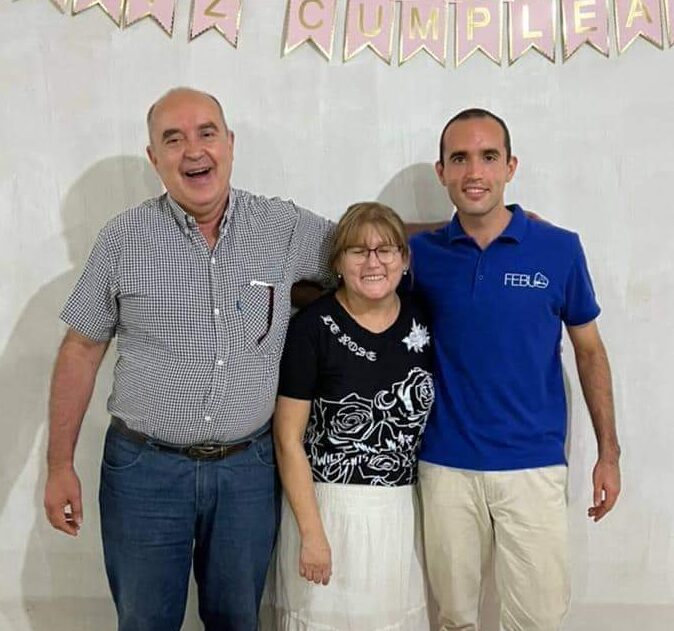About The Missionary
Anibal Fornazarich, a former Catholic, was saved at the age of 17 in Corrientes, Argentina, through the faithful witness of a high school friend. His life changed dramatically in spite of
persecution from his family. After God called him to the ministry, he and his wife Maria studied the Bible at a fundamental Bible institute in Corrientes. The Lord has blessed them with two sons, Josias and Joao, both of whom are active in ministry. Maria accepted Christ through the faithful witness of her brother.
Several years ago, the Fornazarich family moved to Argentina. They currently reside in Mercedes where Anibal pastors the dynamic, growing Bible Baptist Church. While Mercedes serves as the hub of their ministry, they continue to travel to Rivera and Corrientes and other cities in Argentina, Uruguay, and Brazil. Evangelism is done on the radio, through social media, door-to-door, and house meetings, etc.
Latest Prayer Letter
Project Giving Opportunities
Sorry, there are no projects at this time.
Updates From The Field
Sorry, there are no updates at this time.
About The Field:
Buenos Aires, the bustling capital of Argentina, is a city that harmonizes rich cultural heritage with economic dynamism and diverse religious beliefs. As the country’s economic powerhouse, Buenos Aires stands as a global financial hub, reflecting both triumphs and challenges in its economic landscape.
At its core, Buenos Aires pulsates with a fervent economic spirit. The city serves as the epicenter of Argentina’s economic activities, characterized by a complex interplay of industries. Its significance as a financial center is underscored by the presence of major multinational corporations, banks, and stock exchanges, which contribute to its reputation as a key player in South America’s economy.
The city’s economic history has been marked by fluctuating fortunes, from periods of prosperity to tumultuous downturns. Buenos Aires experienced rapid growth in the late 19th and early 20th centuries, fueled by industries like agriculture, meatpacking, and manufacturing, which made Argentina one of the wealthiest nations globally. However, economic instability and political turmoil, punctuated by inflation and debt crises, have also left indelible marks on the city’s financial narrative.
Within Buenos Aires, religious diversity intertwines with its economic endeavors, shaping a vibrant tapestry of faiths and beliefs. The city welcomes a broad spectrum of religious practices, with Catholicism historically dominating the religious landscape. The influence of Catholicism permeates various aspects of life, from cultural traditions to societal norms, owing to its deep-seated roots in Argentine history.
Beyond Catholicism, Buenos Aires has a mosaic of religious groups, including Protestantism, Judaism, Islam, and Eastern religions. This religious diversity has significantly contributed to the city’s social fabric. Places of worship, from majestic cathedrals to synagogues, mosques, and temples, stand as testaments to the city’s confusion in religious pluralism.
In recent decades, Buenos Aires has witnessed a growing trend of secularism alongside the persistence of religious practices. This shift reflects a changing societal landscape, where younger generations, influenced by globalization and evolving social norms, often exhibit a more secular outlook while respecting the religious heritage of their forebears.
Moreover, the economic landscape intertwines with religious institutions, influencing social welfare programs and philanthropic initiatives. Religious organizations often play a pivotal role in addressing societal issues, providing aid and support to marginalized communities, contributing to the city’s social welfare framework.
